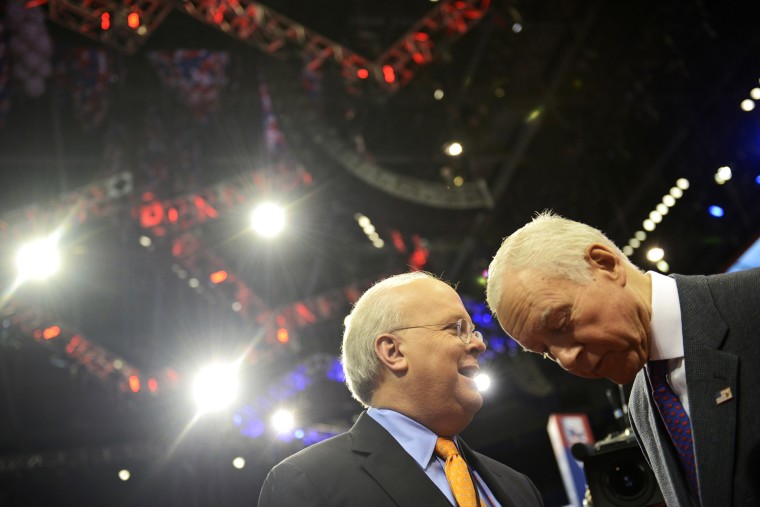It’s not just the Tea Party that can launch a revolt.
Establishment conservatives are in an uproar, too, since they watched Sen. Ted Cruz drive Republicans through budget negotiations that ended in a 16-day government shutdown and left the party tanking in the polls.
The Chamber of Commerce has had enough of Cruz’s antics and so has a big money group linked to Karl Rove, American Crossroads–and they’re both gearing up to play in Republican primary races across the country.
Combined the two groups represent the establishment and business wings of the Republican Party, who are fighting back in what’s become a full blown civil war ahead of the 2014 midterm elections.
“I sort of think about [Cruz] as a tennis player,” said Tom Donohue, the Chamber's president and CEO.
“If you're going to rush to the net all the time, you better have a lot of motion to the left and the right. And he hasn't proved that to me, yet.”
And while Donohue said he’d work with Cruz to get work done, when asked if the business community would like it if the Texas senator would stand down, he said: “That might be one thing we could work on.”
But don't expect the Chamber to call for the head of sitting Republican legislators—even the ones who agitated for a shutdown over Obamacare. Rep. Raul Labrador, for example, was an adamant member of the defund camp and voted against the final deal to reopen the government and raise the debt ceiling. But just last year, he received the Chamber's "Spirit of Enterprise" award, based on his voting record, and the Chamber suggested that members like Labrador would make it up to them in the near future on other key issues.
"I'll give them the benefit of the doubt that before we're finished, they're going to look for ways to help the business community," Donohue said.
"We're not the Debt-Ceiling Limit Association of America," R. Bruce Josten, a Chamber of Commerce executive vice president added.
The Chamber has signaled its interest in a special election in Alabama's first district, which has a primary run-off on November 5and a general election a month later. The GOP run-off is pitting an establishment Republican candidate, Bradley Byrne, against a Tea Party underdog, Dean Young.
Though the Chamber hasn't endorsed any candidate in the election to replace Rep. Jo Bonner, who resigned in August, Byrne would be the obvious choice: He's a former state legislator and business lawyer who's promised to support infrastructure projects-a major priority for the Chamber-and reach across the aisle. By contrast, Young is a hardline conservative who believes "we are witnessing the end of the Western Christian empire" and who said he would have voted down the debt ceiling. The Chamber says it's watching the race closely. "I think we're probably actively interested in it," said Bruce Josten, the Chamber's chief lobbyist, said on Monday, though he declined to elaborate upon the group's specific plans. "Why would I telegraph to every adversary in the political world-'here's what we're planning to do in Alabama'?"
Meanwhile, American Crossroads is tired of seeing winnable Senate seats slip through their fingers. The big money group plans to take a more active role in next year's primaries to make sure candidates are properly vetted so a weak candidate, such as a Christine O'Donnell in Delaware or a Sharron Angle in Nevada, don’t hurt their chances in competitive statewide races.
That could include disseminating deep local research with other groups who may be interested in their findings, but could include more paid efforts too, including early spending to keep a flawed candidate from surging.
The rise of the outside groups has prompted much grumbling from more mainstream Republicans, especially given Cruz's hardline stance he hasn't backed down from -- which many believe threatened their ability to lobby for a one year delay in Obamacare's individual mandate, which could have swayed even some moderate Democrats. "We missed an opportunity to delay Obamacare," Jonathan Collegio, Crossroads communications director said on Monday's The Daily Rundown. Cruz's strategy was fueled in large part by the Senate Conservatives Fund, founded by Jim DeMint, and Heritage Action, the political arm of DeMint's Heritage Foundation.
The biggest shot yet came Friday when SCF made formal their endorsement of Senate Minority Leader Mitch McConnell's challenger Matt Bevin -- a huge undertaking and the biggest target yet -- which carries big risks. And while even other influential conservative groups have shown more restraint -- the Club for Growth didn't follow suit in endorsing Bevin over McConnell in Kentucky, citing his high score from the group -- it's Senate Conservatives Fund that's borne the brunt of establishment disdain, saying this is only a fundraising tactic for the group. That's something SCF pushes back against, saying that it's their Obamacare stance that's netted them record amounts, pulling in $2.1 million in September alone, and they used that money to push their efforts to defund the president's health care law. "Americans donate to us because they know we will fight liberal policies and work to elect principled candidates," SCF Executive Director Matt Hoskins told MSNBC.com "If the Republican establishment is upset about that, they should stop acting like Democrats and join the fight to save this country." But if other groups like Crossroads and the Chamber can come in and pick up the difference, instead of looking past them to general elections, it raises the stakes significantly and could help Republican dreams of taking back the Senate alive.
"It's a matter of incentives," said Collegio. "There is a saturation among the groups that are going after Democrats, so there is a space there to go after the ideological purity of your colleague."
